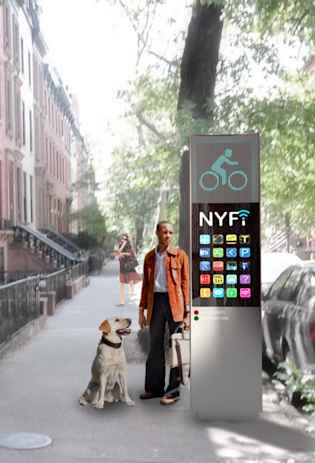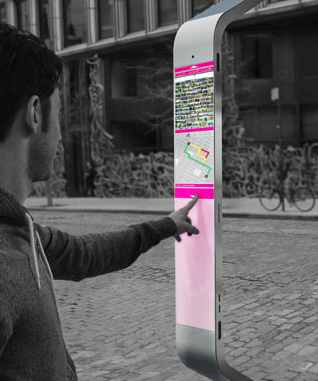 You can still see more than 10,000 coin-operated phones around New York City today. What seems a relic of the past in this age of mobile technology, became a vital link in an emergency for those who had no power to charge their devices during Hurricane Sandy.
You can still see more than 10,000 coin-operated phones around New York City today. What seems a relic of the past in this age of mobile technology, became a vital link in an emergency for those who had no power to charge their devices during Hurricane Sandy.
Still, many of the phone booths scattered across the city are rotting in disrepair, so Mayor Michael Bloomberg launched a design contest in December to “re-own the phone”. He invited designers to submit ideas that might include solar panels, wi-fi, charging station, and information kiosks — anything to give the booths a make-over and bring their communications potential into the 21st century.
Last year the city launched pilot programs currently underway to test new services with the payphone infrastructure, including digital advertising on phone kiosks around Times Square, interactive touchscreens to help tourists around Union Square and free public Wi-Fi at 13 locations across the city.
From 125 prototypes submitted in February, a panel of judges picked five winners in various categories. The most popular design was chosen on the city’s Facebook page.
Best Connectivity (and Most Popular): NYFi – (Pictured above) An interactive portal to public information, services, and a hub for free wireless internet access, with open infrastructure for future applications. This replaces the hodgepodge of street appliances that currently litter the sidewalk like bus ticket machines, Muni Meters, MetroCard machines, assistance kiosks, bicycle share stations and of course, payphones.
Best Visual Design: Beacon – A 12 foot slender tower with an upper screen for advertisements that provide revenues giving free access to the other functions — a touch-free and hygienic telephone controlled by your voice and gestures in the air, with a wide variety of city service functions, many in case of emergency.
Best in Creativity: NYC Loop – A contemporary payphone with access to the latest technology that can be tailored to suit New York’s diverse communities. Piezoelectric pressure plates convert kinetic energy into electric energy to supply the Loop with power.
Best Functionality: Smart Sidewalks – (Pictured below) Smart Sidewalks is driven by two competing aims: to pack as much function into a single device as possible and to reduce the phonebooth’s footprint. “Everything” –communication, sustainability, and wayfinding is squeezed into “nothing” – a 6” wide interactive strip that folds up from the sidewalk.
(Tie) Community Impact: The Responsive City – By updating the payphone with a modern array of sensors and displays to create a foundational input/output system for an open, urban-scale computing platform, we can allow New York City to respond to and serve the people. Through open access to real time data and a distribution platform for community, civic, arts and comercial apps and messaging.
(Tie) Community Impact: Windchimes – environmental sensor stations that talk through payphones. They can plug directly into existing technologies and communication infrastructure, making them low cost and immediately deployable.
WATCH the video from the BBC below)



















